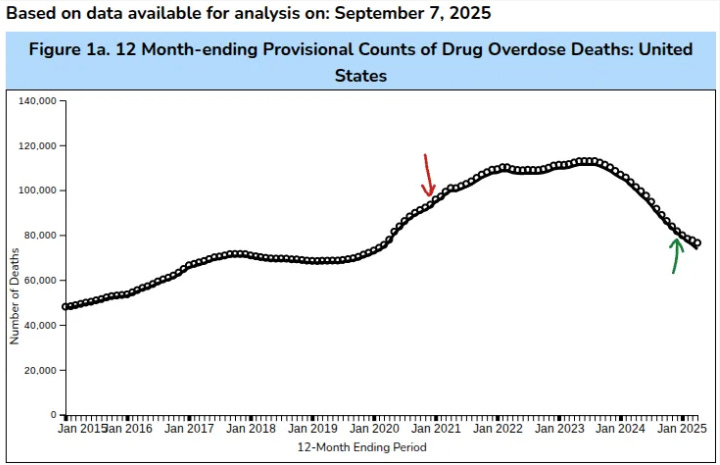Murder Doesn't Stop Drugs
But stopping drugs isn't the plan.
The Trump administration has now destroyed over 20 boats and killed more than 80 people during the last two and a half months without any form of due process. Even when the US apprehended two survivors from one of the strikes, they were released to their home countries due to a lack of legal standing to hold or prosecute the individuals. That shows how messy and illegal this military operation has become.
Even worse is that these strikes will do nothing to stop the flow of drugs into America.
The current lethal strikes on suspected smuggling boats aren’t the first time military force has been used against drug cartels:
Operation Snowcap - 1987-1995 - Military forces and DEA conducting operations with Bolivia, Peru, and Ecuador as the primary focus.
Operation Just Cause - 1989-1990 - A US military invasion of Panama to depose Manuel Noriega from power.
Air Bridge Denial Program - 1990s-2000s - Air interdiction program to combat suspected narcotics aircraft from Colombia and Peru.
Plan Colombia - 1999-2000s - Training combined with large eradication efforts conducted alongside Colombian armed forces. Aerial eradication spread into Peru and Bolivia.
Operation Anvil - 2012 - DEA tactical units, along with State Department resources, conducted operations in Honduras that resulted in multiple deadly force incidents.
This aggressive approach began when Ronald Reagan declared a war on drugs. It was intended to dramatically reduce the use of illegal narcotics in America and stop the flow of smuggled drugs entering the country. It failed miserably.
Over $1 trillion has been spent on the war on drugs, only to see US drug issues worsen over the past 50 years. Three hundred sixty thousand people are currently incarcerated in the US on drug charges, with an average cost of $40,000 per year per federal inmate. Illicit drug use has increased over time, as have overdoses. Drug-related violence has worsened, and communities have been torn apart.
Beyond the history of this type of approach not working, there are other issues with the claims that these attacks are to stop drug smuggling to the US.
Trump is claiming that each boat strike saves 25,000 US lives because of how much fentanyl the smugglers are carrying. However, Venezuela doesn’t smuggle fentanyl; they have a minor role in the cocaine trade, and they smuggle mainly to Europe, not the United States. Some of these boats may also be smuggling oil or gasoline. Both are black-market products in the region due to economic issues in various South American countries.
The people being killed are labeled as narcoterrorists. But the reality is that cartel leaders do not get involved in the low-level smuggling operations. They pay people who are desperate for money. Those are the people being killed. They will be replaced over and over again.
Cartels in Mexico manufacture fentanyl, and it enters the US through the Southern Border. It is smuggled in primarily by US citizens. The reason fentanyl is such a popular drug for smuggling isn’t just because of America’s opioid addiction, but also because of the drug’s potency. Fentanyl is 50-100 times more powerful than morphine.
When marijuana smuggling was the focus decades ago, there would be pictures of drug busts with bales of cannabis stacked high behind the officers who conducted the operation. Marijuana has low potency, which is one of the reasons it doesn’t cause overdoses, and is also the reason it has to be smuggled in high volume to make a profit. A sandwich bag of fentanyl smuggled in a car crossing the Mexico border makes a hefty payday. Sometimes it is even shipped directly by mail via the US Post Office.
If the war on drugs isn’t getting results, what will? Fortunately, we already know.
Here is a graph of US drug overdoses per year. The red arrow points to December 2020, and the green arrow points to December 2024. This graph begins when fentanyl had already become the leading cause of overdose deaths.
There was a large spike in deaths in 2020, particularly during the pandemic. The increases continued until the summer of 2023, after which overdose rates began to plummet.
This improvement wasn’t because we were bombing anyone or murdering people in boats. These results came from education about drugs, including evidence-based prevention programs for youth, expanded access to addiction treatment, increased availability of naloxone, a drug that helps reverse opioid overdoses, and access to fentanyl testing strips, because fentanyl is being mixed into other drugs people are using without their knowledge.
These are solutions that have been known to work for a long time, but are not invested in as much as they should be due to how some view drug use. Instead of understanding that addiction is a disease, and that many people got addicted to opioids due to them being overprescribed by doctors, a lot of America views drug users as deviants who must be punished. When an addict has the opportunity to go to a counseling service that helps them break their addiction without shame or prosecution, they often take it. When people are arrested for seeking treatment, they avoid it.
As long as there is a high demand for drugs in the US, there will be people smuggling drugs into the country, no matter how many military strikes America takes against other nations. But that isn’t even why there is a focus on Venezuela.
If Venezuela isn’t a major drug smuggling nation, isn’t the source of our fentanyl problems, and military action against drug cartels has done nothing to improve America’s drug problem, why are there over a dozen warships, including an aircraft carrier, submarine, and amphibious assault vehicles, spy planes, B-1B and B-52 bombers, 10 F-35 fighter jets, Osprey transport aircraft, helicopters, and 15,000 US troops now positioned near Venezuela?
Regime change.
The Trump administration wants to oust President Maduro from power. The 2018 Venezuelan election was a sham where the opposition had been banned from the election, jailed, or forced to flee. In 2024, Maduro likely lost the election, but his tight authoritarian control over the government allowed him to claim victory and remain in power.
While the affront to democracy and human rights violations happening in Venezuela is a good enough reason to oppose its government, that is unlikely to be the reason for Trump’s aggression.
One reason is that Venezuela is allied with China and Russia, nations with which America is strongly at odds. The United States does not want either nation to have a strong foothold in the Western hemisphere.
The second reason is oil. Venezuela has massive oil reserves. A Venezuelan government more friendly to the US could allow access to these reserves to boost US energy security, dominance, and economic influence.
Trump is hoping to put enough pressure on Venezuela that those closest to Maduro who are helping him maintain power will turn against him, toppling the regime. That approach hasn’t been working, even with the US offering a $50 million reward for information that results in the arrest and conviction of Maduro.
Now, Trump has declared the Cartel de los Soles to be terrorists, which opens the door for strikes within Venezuela instead of being limited to boats in the ocean. And Trump has claimed he would not need Congressional approval to commit those strikes.
While Trump hasn’t committed to a war against Venezuela, the increased US military presence leaves the option on the table. Given the bombing of Iran and the US military strikes within Yemen from March to May of this year, direct attacks against Venezuela would not be overly surprising.
Does America have the appetite for another war started on false pretenses? If Congress reasserts its control over war powers, hopefully, we won’t have to find out.
https://edition.cnn.com/2025/11/16/politics/venezuela-cartel-state-department



